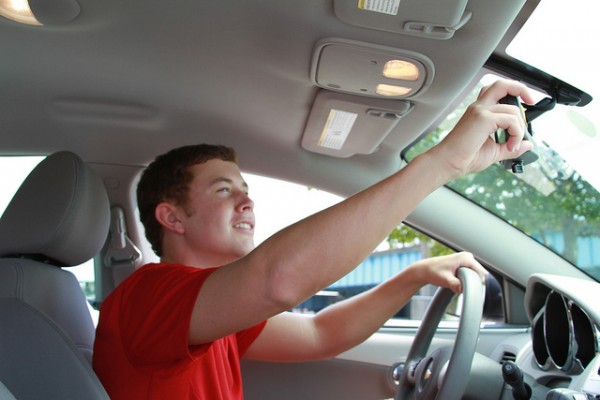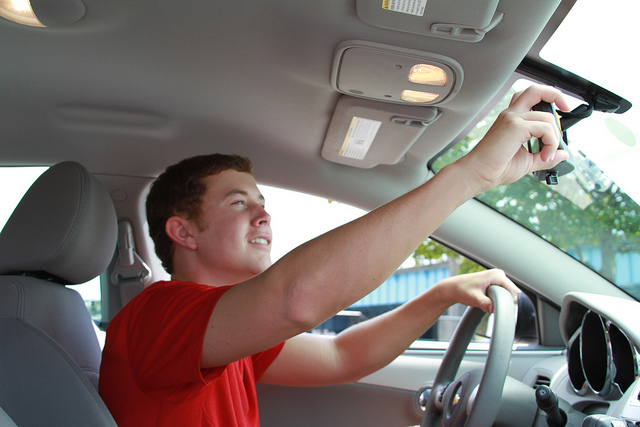Your teen has worked hard for his driver’s license. But that first year behind the wheel can be especially dangerous. Just because a young person has completed driver training and passed a written test doesn’t mean he’s ready for the varied situations he will encounter on the road.
It’s imperative that your teen acquires the knowledge and experience to help him avoid accidents. Inexperience, coupled with overconfidence and youthful exuberance, can open the door to tragedy. Typically, driver training is unable to address all of the real-world dangers your teen may encounter. Most new teen drivers are woefully unprepared for the unexpected.
Regardless of your child’s driver training experience, you should make it a priority to cover the following scenarios with him before allowing him to drive solo.

1) Distracted Driving
People text and talk on their phones at an alarming rate when behind the wheel, a behavior that has led to a large increase in traffic-related fatalities and injuries. A study by the U.S. Department of Transportation’s National Highway Traffic Safety Administration (NHTSA) estimated that at least 3,000 vehicular deaths annually are attributed to distracted driving. The main culprits are drivers under 25. The study revealed they are three times more likely to text while driving than their older compatriots.
Phones aren’t the only distraction teens should worry about. Driving with friends in the car is another cause of inexperienced driver accidents. Teens have enough to do behind the wheel without having to deal with rambunctious friends.
The best solution for distracted driving is to avoid the distractions. Parents should make sure their teen realizes that his first six months of driving is a probationary period. Phones should be turned off and placed out of reach. And no riders other than parents should be allowed during the six month probation.
2) Driving While Intoxicated
Although it should go without saying that drinking and driving is a no-no, there are still thousands of teenagers who get behind the wheel after a few beers. Unless a driver is at least 21 years old, however, he runs the risk of getting a DWI conviction with less than one drink. Indeed, according to Philadelphia attorney Steven Kellis, a person can potentially be arrested for DUI for just sitting behind the wheel with the keys in the ignition.
Most states have a zero tolerance policy for underage drinking, and this can cause your teen to lose his license for up to a year. Much worse is the possibility of being involved in a drinking-related accident that results in injuries or fatalities.
Make sure your teen driver knows the dangers and the consequences of driving while intoxicated, and can recognize developing situations and peer pressures that might tempt him to drink and drive. And if he does find himself in a situation where he’s had a few drinks, let him know he can call you for a ride home—no questions asked, and no repercussions.
3) Night Driving
Highway driving at night, especially amid truck traffic, can be a frightening experience. A new driver might have difficulty properly gauging distances at night, and the myriad lights around him can lead to confusion. If your teenager is not paying attention, he could easily get into an accident.
Make sure your teen has adequate experience driving at night—on the open highway, within the city, and in rainy conditions.
4) All-weather Driving
As part of their training, your teen should have had the opportunity to drive in varied weather conditions. It’s a good idea, however, to check him out in these conditions to make sure he knows how to handle them.
- Driving in rain presents several problems. Visibility decreases, so teach your teen to slow down accordingly. In light rains, roads can become slick as water lifts and suspends oil from the road’s surface. Heavy rains can flood roads and lead to hydroplaning. Teach your teen the importance of leaving plenty of space between him and the car ahead. Make sure he knows how to handle a skid, and what to do if he runs off the road. Over-correcting after leaving the road is one of the leading causes of accidents in inexperienced drivers.
- Fog is difficult for even the most experienced drivers to deal with, so it is crucial to discuss this potential issue with your teenager. Your teen driver needs to slow down when encountering fog, and turn his dim lights on so others can see him. Bright lights create glare in fog, and their use should be avoided.
- With just a dusting of snow, roads can begin to get slick. Therefore, all drivers need to slow down, provide a larger gap between the vehicles around them and begin the process of braking earlier than usual. If his car starts to skid, your teen should immediately take his foot off the accelerator. Make sure that he knows not to slam on the brakes as this can make the situation worse. If one is available, a little time on a skid pad can make a world of difference in learning how to drive out of a skid.
5) Interstate Driving
A teen’s initial drive on an interstate can be a terrifying experience. With so much apparently going on, there’s a danger of sensory overload. But the ability to drive on the interstate is a necessary evil in our society.
Your teen should be able to merge easily with interstate traffic, entering the flow at the same speed the other vehicles are traveling. He should know how to properly signal when changing lanes, and be able to use his mirrors to keep track of what’s happening around him. Knowing the hierarchy of road signs is a must to avoid confusion at critical times.
Interstate driving should be practiced under all conditions, and especially at night when the long-haul truckers are out. Driving among the big rigs can be intimidating, but with proper exposure and preparation, your teen should be able to adapt to it in no time.
You can help your teenager get safely through their first year of driving by discussing these situations with him, and then gradually letting him experience the situations on the road. After he has a year or two of real world experience under his belt, it will become much easier for him to react correctly in a wide variety of different driving situations.
Richard Freeland is the father of two boys who, luckily, survived their teen driving days with only fender benders. Steven Kellis is a Philadelphia DUI attorney with over 20 years experience counseling and defending folks involved in DUI incidents.
Photo courtesy State Farm, Flickr

